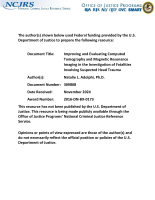Blunt force trauma injuries
An Evaluation of the Directional Relationship Between Head Injuries and Subsequent Changes in Impulse Control and Delinquency in a Sample of Previously Adjudicated Males
Traumatic brain injury and mental health outcomes among recently incarcerated men
Predicting alternate light absorption in areas of trauma based on degree of skin pigmentation: Not all wavelengths are equal
Head biomechanics of video recorded falls involving children in a childcare setting
Quantifying the Degree of Bruise Visibility Observed Under White Light and an Alternate Light Source
High-Rate Anisotropic Properties in Human Infant Parietal and Occipital Bone
Accounting for Multiple Nonfatal Strangulation in Intimate Partner Violence Risk Assessment
A Decade of Experimental Research on Blunt Force Cranial Fracture
A comparison of three decalcification agents for assessments of cranial fracture histomorphology
Intimate Partner Violence and Miscarriage: Examination of the Role of Physical and Psychological Abuse and Posttraumatic Stress Disorder
The Repository of Antemortem Injury Response (REPAIR): an online database for skeletal injuries of known ages
Fracture Patterns on the Infant Porcine Skull Following Severe Blunt Impact
Head Injury Screening and Intimate Partner Violence: A Brief Report
Fracture Characteristics of Entrapped Head Impacts Versus Controlled Head Drops in Infant Porcine Specimens
Biomechanical Studies on Patterns of Cranial Bone Fracture Using the Immature Porcine Model
Statistical Skull Geometry Model for Children 0-3 Years Old
Quantitative Differentiation of Bloodstain Patterns Resulting From Gunshot and Blunt Force Impacts
Role of Interface on the Impact Characteristics and Cranial Fracture Patterns Using the Immature Porcine Head Model
Age-Dependent Fracture Characteristics of Rigid and Compliant Surface Impacts on the Infant SkullA Porcine Model
Characteristics and Prediction of Cranial Crush Injuries in Children
Role of Interface Shape on the Impact Characteristics and Cranial Fracture Patterns Using the Immature Porcine Head Model
Forensic Aspects of Elder Abuse
This NIJ Conference Panel will feature the latest research on forensic aspects of elder abuse detection and prosecution. Panelists will discuss results from a recently completed study that examined the characteristics of pressure sores on elders who received quality care, emphasizing how this research informs the field about the warning signs of potential neglect. Panelists will also present findings from a study on how well elderly individuals with mild or moderate dementia remember emotional events.



